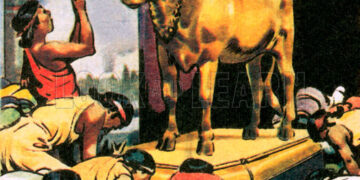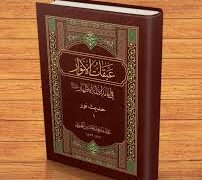The Prophet (PBUH) said: “On the Day of Judgment, I will intercede for Abu Talib in such a way that all jinn and mankind will be astonished.”
The author is Hamed Sarem.
“Abstract”
This article examines the role of Abu Talib (AS) in supporting the Prophet of Islam (PBUH) and defending Islam. Satan has always strived to extinguish the divine light of guidance, but God, with His power, prevented the destruction of the path of guidance. At Ghadir Khumm, Satan’s last hope to extinguish the light of guidance was dashed. However, the enemies of Islam, particularly the party of Samiri, attempted to deviate the path of guidance by creating seditions and innovations. One of these conspiracies was the insult to the father of the Commander of the Faithful, Abu Talib (AS), and the fabrication of false hadiths such as the hadith of “Dahdah,” which was propagated by Mughirah ibn Shu’bah, an enemy of the Banu Hashim. Imam Ridha (AS), in refuting these fabricated hadiths, confirmed the faith of Abu Talib (AS) and described him as a companion of the prophets and the righteous. Abu Talib (AS) played a significant role in supporting Islam through unparalleled sacrifices, such as placing his son in the Prophet’s (PBUH) place to protect him and threatening to kill the leaders of Quraysh. After the passing of Abu Talib (AS), the Prophet (PBUH) attended his funeral and promised him great intercession on the Day of Judgment. This article, based on reliable Shi’a sources, examines the faith and status of Abu Talib (AS) and highlights his role in Islamic history.
“On the Day of Judgment, I will intercede for Abu Talib in such a way that all jinn and mankind will be astonished.”
“On the occasion of the anniversary of the passing of Abu Talib, the father of Ali (pbuh);”
(pbuh stands for “peace be upon him.”)
“The Prophet attended the funeral of Abu Talib and said to those present: ‘On the Day of Judgment, I will intercede for Abu Talib in such a way that all jinn and mankind will be astonished.'”
Religion and Thought Group of “Student News Agency” – Hamed Sarem:
Satan has always strived to extinguish the divine light, sparing no effort in this endeavor. At times, he teaches the fire-worshippers of Nimrod to ignite flames in order to burn Abraham (AS), the iconoclast of prophetic history, in the fire. At other times, he instructs the Samiri to replace monotheism with a golden calf. Yet again, he teaches the devilish to crucify Jesus, aiming to extinguish the light of guidance. However, “the hand of God is above their hands,” and Jesus, by the will of God, ascended to the heavens, while someone resembling him was crucified. The Samiri’s calf was burned by Moses (AS), and the fire turned into a garden for Abraham (AS). God will never allow the path of guidance to be closed. Satan’s last hope was also dashed at Ghadeer, for the disbelievers will never be able to extinguish the light of guidance: “Today, the disbelievers have despaired of your religion.”
Despite Satan’s knowledge of the truth of God’s words, he refused to prostrate before Adam, even standing against God despite knowing the divine punishment, declaring, “I will mislead Your servants.” Satan also knew that with Ghadeer, the religion of Islam was perfected, and with Ghadeer, there would be no deviation or distortion for anyone seeking the truth. Yet, Saqifa emerged, repeating the story of Samiri and his calf. However, this time, those whose hearts were illuminated by Ghadeer refused to bow before the Samiri’s calf, even if it meant sacrificing their lives to preserve Ghadeer.
Insulting the Father of the Commander of the Faithful, Ali (AS): The Injustice Done to Him
The Party of Samiri did not cease their mischief. At every moment, through creating sedition, deviation, and innovation, they sought to extinguish the path of guidance. Time and again, they created sedition, deviation, and innovation. However, their innovations never found a place in the school of the followers of Ghadeer throughout history. Among the schemes of the devilish was the insult and disrespect toward the father of the Commander of the Faithful, Ali ibn Abi Talib (AS). The party of Samiri spared no injustice or oppression against the Commander of the Faithful, Ali (AS), from insulting him to cursing him from the pulpits. Despite knowing that Ali (AS) was the soul of the Prophet, they did not stop there and even attacked the faith of his father. This false accusation was an insult to the status of the Commander of the Faithful, as they called his noble father a disbeliever—God forbid.
Fabrication of False Hadiths
They fabricated the false hadith of “Dahdah” (a shallow pool of Hellfire) for Abu Talib. The hadith of Dahdah (Hellfire) was propagated by Mughirah ibn Shu’bah, a devoted supporter and close companion of Abu Sufyan from the era of ignorance. It claimed that Abu Talib is in Dahdah (a pool of fire), wearing fiery shoes that cause his brain to boil from the heat. (Here, we must apologize to Imam Mahdi (AS) and the Commander of the Faithful (AS) for narrating this fabricated hadith.) All these narrations trace back to Mughirah ibn Shu’bah, who was among the haters of the Banu Hashim, the killers of Lady Fatimah (AS), and a loyalist of the Umayyad dynasty.
As for the verse, “Indeed, you cannot guide whom you love, but Allah guides whom He wills” (28:56), they apply it to Abu Talib, even though this verse was revealed in Medina. As mentioned in Al-Hujjah ala al-Dhahib, its context of revelation relates to the polytheists of the Battle of Uhud. When the Prophet’s tooth was broken, he said, “O God, guide my people, for they are ignorant,” and God revealed this verse about them. Some have also said that the verse was revealed regarding those who refrained from migration (1).
When this fabricated narration was mentioned in the presence of Imam Ridha (AS), he said: “The enemies of God have lied. Indeed, Abu Talib is among the companions of the prophets, the truthful, the martyrs, and the righteous, and what excellent companions they are.” He further said, “If you doubt the faith of Abu Talib, your end will be the Fire” (2).
Hostility Toward the Ahl al-Bayt (AS)
Sayyid ibn Tawus writes:
“We have not seen or heard that in considering anyone a Muslim, they resort to the strictness they apply in the case of Abu Talib. This is because their known approach is that they consider any disbeliever a Muslim based on the slightest solitary report they find, even if it contains only a small hint supporting their claim. However, their enmity toward the Hashimites has reached such a level that they deny the faith of Abu Talib, despite clear evidence proving it. (3)“
Who truly is Abu Talib, that there is so much disagreement about his faith? And what is the significance of whether he believed or not? Many of the Prophet’s close relatives did not believe, while many who were not close to him did. So why do some insist on his disbelief, while others insist on his faith?
In response, it must be said that since the followers of Satan’s path could not find any flaw in the Commander of the Faithful, Ali (AS), and could never take even the slightest issue with him—despite their deep-seated hatred for him—they targeted his noble father. They tried to portray him as a disbeliever, hoping to diminish the lofty status of the Commander of the Faithful in their deluded minds. However, it must be said: “O fly, the realm of the Simurgh is not your playground. You only expose yourself and trouble us.”
He, who stands at a rank equal to the successors of the prophets, cannot be imagined as a disbeliever. Therefore, the Shia unanimously believe in his faith. Some of his characteristics are mentioned here to draw attention to his high status and to further prove the necessity of his faith.

Threats of Killing the Leaders of Quraysh
Abu Talib (may God be pleased with him) risked his life and the lives of his tribe to support the Prophet of God in Mecca. In defending the Prophet, he went so far as to order the killing of the leaders of Mecca. On the night the Prophet ascended to the heavens (Mi’raj), Abu Talib did not see him in Mecca. He called all his children and servants, armed them, and commanded them to go to the Kaaba in the morning. Each of them was to stand beside one of the leaders of Quraysh, who were seated around the Kaaba—all of whom were among the most prominent figures in Mecca. Abu Talib instructed them that if they did not find the Messenger of God in the morning or hear any news of him, he would signal for the leaders of Mecca to be killed, and they were to carry out this order.
At sunrise, the Prophet returned. When Abu Talib saw him, he stood up joyfully and kissed the space between the Prophet’s eyes. Then he said: “O son of my brother, I swear by God, if you had been delayed, not a single one of Mecca’s leaders would have remained alive…” (4)
Sacrificing His Son for the Sake of the Prophet
The Valley of Abu Talib was one of the most difficult periods in the life of the Prophet. During this harsh siege, the men of Banu Hashim defended the Prophet’s life to ensure that the enemies would not harm him at night. Among them, Abu Talib’s defense of the Prophet was truly admirable, demonstrating the strength of his faith in the Prophet. He would have his son sleep in the Prophet’s place at night so that if any harm were intended for the Prophet, Abu Talib’s son would be the one sacrificed (5).
Can it be claimed that Abu Talib, who defended the Prophet with such intensity and sacrifice, did not believe in his prophethood? If there is even a shred of fairness, it must be acknowledged that faith had deeply penetrated Abu Talib’s heart. After the passing of Abu Talib (AS), by the order of the Prophet, Ali (AS) washed his body, and the Prophet attended his funeral. Addressing those present, he said: “On the Day of Judgment, I will intercede for Abu Talib in such a way that all jinn and mankind will be astonished” (6).
The Prophet, during the lifetime of Abu Talib, was honored and protected by his support.
As long as Abu Talib was alive, the Prophet was honored in Mecca, and no one dared to harm him. However, after Abu Talib passed away, the Quraysh united to persecute the Prophet and hinder his mission. The Angel Gabriel (AS) descended upon the Prophet and said: “God sends you His greetings and says: ‘Leave Mecca, for your supporter and protector has passed away'” (7).
There is much to say about the status and faith of Abu Talib. Shi’a scholars, from ancient times to the present, have authored numerous books on the virtues of Abu Talib, which cannot all be mentioned in this brief text (8). Therefore, we will only refer to the narration of Imam Ridha (AS), which highlights the knowledge and greatness of the father of Ali (AS) and proves the true faith and belief of Abu Talib (AS).

The Inscription on the Ring of Abu Talib
Imam Ridha (AS) said:
“On the ring of Abu Talib, these words were inscribed:
‘Raditu Billahi Rabban, wa bi-ibni akhi Muhammadan Nabiyyan, wa bi-abni Ali Wasiyyan.’
(I am content that Allah is my Lord, that my brother’s son Muhammad (PBUH) is the Prophet, and that my son Ali (AS) is the successor.) (9)“
Footnotes:
- Al-Khisal / Translated by Kamarei, Vol. 2, p. 39: “Why did Abu Talib not officially join the party of Islam?…” p. 36.
- Bihar al-Anwar – Al-Allamah al-Majlisi – Vol. 35 – pp. 110–111.
- Sayyid ibn Tawus in Tara’if, p. 87, as quoted from: Al-Ghadir (Persian) – Al-Sheikh al-Amini (Translated by a group of translators) – Vol. 14 – pp. 343–346.
- Iman Abi Talib – Al-Sheikh al-Mufid – pp. 23–24: “Sheikh Mufid writes that this narration is unanimously agreed upon by historians and biographers.”
- Al-Sahih min Sirah al-Imam Ali (AS) – Al-Sayyid Ja’far Murtada al-Amili – Vol. 2 – pp. 81–84.
- Iman Abi Talib – Al-Sheikh al-Mufid – pp. 25–26.
- Iman Abi Talib – Al-Sheikh al-Mufid – pp. 24–25.
- Some of these books include:
- Iman Abi Talib by Sheikh Mufid,
- Al-Hujjah ala al-Dhahib ila Takfir Abi Talib by Sayyid Fakhhar ibn Ma’d al-Musawi (d. 630 AH),
- Abu Talib: Mu’min Quraysh by Abdullah al-Khunayzi,
- Abu Talib: Batal al-Islam by Al-Khalid by Sayyid Haydar Muhammad Sa’id al-Arfi,
- And Al-Sahih min Sirah al-Imam Ali (AS) also discusses this topic in part.
- Al-Sahih min Sirah al-Imam Ali (AS) – Al-Sayyid Ja’far Murtada al-Amili – Vol. 2 – pp. 102–104
















